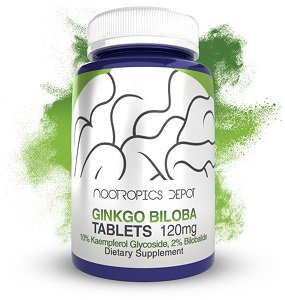Here’s How to Treat Depression Naturally (14 Proven Methods)

Statistics from the World Health Organization say that around 300 million people in the world are suffering from depression. [1]
Although many won’t agree, depression is becoming a global disorder, with many people experiencing depressive episodes every year. Depression is a serious problem that can often be fatal, which is why we should take it more seriously.
The thing about depression is that cheering up the person suffering from it does nothing. Depressive people are often told to lighten up and they wish it could be that simple.
But, it really isn’t. Depression is a disease and should be treated as one. It’s not a failure or personal defect or weakness – it’s a result of chemical imbalances in the brain and a medical condition.
It affects 21 million people in the USA annually, with about 20% of all adults in the world experiencing a depressive episode every year. [2]
The Signs and Symptoms of Depression
Depression is a mental health condition that can affect individuals differently, but there are common signs and symptoms to look out for. Some of them are:
- Persistent Sadness: One of the primary indicators is a persistent feeling of sadness, emptiness, or hopelessness. It’s not just feeling down for a day or two; it lingers for weeks or even months.
- Loss of Interest: People with depression often lose interest in activities they once enjoyed. Hobbies, socializing, and even everyday tasks can become uninteresting or burdensome.
- Changes in Appetite and Weight: Depression can lead to significant changes in appetite. Some individuals may overeat and gain weight, while others may lose their appetite and lose weight.
- Sleep Disturbances: Insomnia or excessive sleeping are common in depression. Some may have trouble falling asleep, while others wake up too early and can’t get back to sleep.
- Fatigue: A constant feeling of fatigue and lack of energy is another sign. Simple tasks can become exhausting, and individuals may feel physically drained.
- Difficulty Concentrating: Depression often affects cognitive function, making it challenging to concentrate, make decisions, or remember things.
- Feelings of Worthlessness or Guilt: Individuals with depression may experience intense feelings of worthlessness, guilt, or self-blame, even if there’s no rational basis for these emotions.
- Physical Symptoms: Some people with depression may experience physical symptoms such as headaches or digestive problems that don’t respond to treatment.
- Irritability: Instead of sadness, some individuals may predominantly feel irritable or agitated, especially in men.
- Suicidal Thoughts: In severe cases, depression can lead to thoughts of suicide or self-harm. If you or someone you know is experiencing these thoughts, it’s crucial to seek immediate help.
- Social Withdrawal: Depressed individuals often withdraw from social interactions, preferring isolation to company.
- Physical Aches and Pains: Unexplained physical complaints like back pain or muscle aches can sometimes be linked to depression.
In general, there are feelings of anxiety and emptiness, loss of interest, mental and physical fatigue, and suicidal thoughts. Some patients have also reported insomnia, problems with concentration and movements, and appetite changes as well.
It’s important to note that not everyone with depression will experience all of these symptoms, and the severity can vary. Additionally, these symptoms should persist for at least two weeks to be considered clinical depression.
How to Treat Depression Naturally
Depression is either treated by medications or psychological therapy. However, since both tend to be ineffective in many cases, you should know that depression can be treated naturally. Not with remedies, of course, but with small lifestyle changes that will help you get out of the routine and defeat depression.
1. Set Small Goals
According to experts, setting far-reaching goals is not that good for our mental health. Far-reaching goals are much harder to reach, but setting smaller goals can help motivate you to achieve them.
Start with tiny daily tasks and work your way up – it will do a world of difference and you’ll feel happier as a result.
2. Set a Simple Routine
When someone is dealing with depression, they often feel like staying in bed all day and have no energy or desire to do anything. But, if they create a basic and flexible schedule for themselves to follow, it can help them break out of this cycle and start feeling more motivated to live their life.
Imagine it like this: Instead of just lying in bed with no plan, they make a simple plan for their day. This plan can include things like getting up at a certain time, having meals, taking a short walk, or doing a hobby they enjoy. Having these small tasks to do can give them a sense of purpose and help them gradually feel better.
3. Eat Healthily

Recent studies have found a link between unhealthy diets and depression, so if you want to avoid it, you need to eat well. [3]
This means staying away from junk and processed foods and basing your diet on fruits and vegetables. Make sure to drink plenty of water as well, and you should feel much better.
4. Regular Exercise

Working out is the best depression antidote. When we’re exercising, the body releases endorphins in our blood, hormones that make us feel good. These hormones can correct the chemical imbalances in the brain, eventually helping with depression.
While aerobic exercises like running or cycling are known to release endorphins, weight lifting and strength training also have their advantages.
When you engage in weight lifting, your body releases endorphins too, just like with aerobic exercise. Additionally, seeing positive changes in your physique can boost your self-esteem and body image, which can be particularly helpful for people dealing with depression. [4]
Feeling stronger and more confident in your appearance can contribute to an overall improvement in your mental well-being.
5. Get Proper Rest
Insomnia, which is the difficulty in falling asleep or staying asleep, has been linked to an increased risk of depression. [5]
When you don’t get enough sleep at night, it can leave you feeling anxious and more prone to depressive thoughts and feelings.
To counteract this, it’s crucial to aim for a good night’s sleep, ideally between 6 to 8 hours. Getting enough sleep not only helps you feel more refreshed and energetic but also plays a vital role in maintaining your emotional well-being.
6. Get Some Supplements
Supplements such as fish oil and folic acid have been found to reduce depressive symptoms. [6]
In a study, pregnant women with depression were given omega-3 fatty acids or a placebo. Those who took omega-3 had lower depression scores and a higher response rate.
Omega-3 supplements were well-tolerated with no harm to the mothers or newborns. This suggests omega-3 may help treat depression during pregnancy, but more research is needed.
7. Be Mindfull
Being mindful means paying close attention to the present moment without getting caught up in worries about the past or future. When you’re depressed, your mind often races with negative thoughts about things that haven’t happened yet, which can be tiring.
Practicing mindfulness involves focusing on what’s happening right now, like your breath, sensations in your body, or the world around you. By doing this, you can let go of those overwhelming thoughts and find relief. Learning to be mindful can help improve your mental well-being and make you feel better overall.
8. Learn To Be Greatful
Depression doesn’t make us grateful for the things we have in life.
However, by deliberately acknowledging and writing down things you’re thankful for daily, you can shift your focus from negativity to positivity. This practice can help you realize that there are still positive aspects in your life, even when it may seem otherwise, and can contribute to improving your overall outlook and well-being.
9. Try Different Things Every Day
Trying different things every day can help when you’re feeling depressed because depression often thrives on routine and monotony. Doing the same things repeatedly can make depression feel even more overwhelming.
By trying something new each day, you break that cycle. It engages your mind, provides variety, and can bring a sense of novelty and excitement. These new experiences can help shift your focus away from depressive thoughts and give you a fresh perspective on life. Even small changes can make a big difference in how you feel, gradually lifting your spirits and making you feel better.
Ginkgo Biloba Extract Tablets | 120mg | Minimum 10% Kaempferol Glycoside + 2% Bilobalide
High quality Gingkgo Biloba supplement with 90 servings per bottle (one month supply). As a dietary supplement, take 1 Gingko Biloba tablet daily.
This supplement will help you promote cognitive function and cellular function, support cardiovascular function, balanced inflammation and oxidation levels.
⭐⭐⭐⭐⭐ | 4.7 (16 reviews)
10. Connect with Positive People
Surrounding yourself with positive, supportive individuals can make a significant impact on your battle against depression. Socializing with friends and loved ones who exude positivity can help boost your mood and provide a sense of belonging.
Engage in meaningful conversations and enjoyable activities with them, as their uplifting presence can counter the emotional weight of depression, offering a glimmer of light even in your darkest moments.
11. Listen to music
Music possesses a remarkable power to influence our emotions. When combating depression, listening to your favorite tunes can act as a soothing balm for the soul.
Consider listing of joyful and lively music that can compel you to sing along or even break into dance. These uplifting melodies have the potential to infuse your spirit with renewed vigor, offering a ray of light in the midst of emotional darkness.
12. Get More Sun

Sunlight plays a pivotal role in regulating mood and sleep patterns. Exposure to natural sunlight triggers the release of serotonin, the “feel-good” hormone, in our brains.
So, make it a habit to step outside and soak up some sun each day. Whether it’s a leisurely walk in the park or merely basking on your balcony, this simple act can brighten your spirits and mitigate the grip of depression.
13. Limit Drugs and Alcohol
Depression and substance abuse often go hand in hand, creating a destructive cycle. To break free from this cycle, limit the use of drugs and alcohol.
These substances may offer temporary relief, but they ultimately exacerbate the underlying emotional turmoil. By reducing or eliminating their consumption, you pave the way for clearer thoughts and emotions, fostering a healthier mindset.
14. Meditate

Meditation is a powerful tool for cultivating mindfulness and inner peace. Amid the chaos of depression, taking time to meditate can provide much-needed mental respite.
Through focused breathing and self-reflection, you can learn to observe your thoughts without judgment, gradually easing the burden of depressive thinking patterns. Meditation empowers you to regain control of your mind and find serenity amidst the storm of depression.
The Main Risk Factors for Depression
When it comes to the main risk factors for depression, they are many. In most cases, depression comes as a result of grief, abuse, ADHD and anxiety, major life changes (e.g. a new job, moving to a new country, childbirth, marriage, and relationship problems and divorces).
Brain Chemistry: Imbalances in brain chemicals, particularly neurotransmitters like serotonin and dopamine, are essential for regulating mood and emotions. When there’s a disruption in the delicate balance of these neurotransmitters, it can contribute to depression. This imbalance can have genetic roots, meaning some individuals may be predisposed to it due to their family history. Alternatively, external factors such as chronic stress, poor diet, or substance abuse can disrupt neurotransmitter function and potentially trigger depressive episodes.
Life Events and Stress: Traumatic or highly stressful life events can have a profound impact on mental health. Loss of a loved one, job loss, divorce, or financial difficulties can create a state of chronic stress that, over time, may lead to depression. Chronic stress, characterized by prolonged exposure to stressful situations, can alter brain chemistry and increase the risk of depression. Stress management and coping strategies are essential in mitigating this risk.
Personality and Temperament: Certain personality traits can make individuals more susceptible to depression. A pessimistic outlook, for example, can lead to a negative interpretation of events, making it more challenging to cope with adversity. Low self-esteem can contribute to feelings of inadequacy and sadness. Excessive self-criticism can create a constant sense of self-blame, which can be a significant factor in the development of depression. Therapeutic interventions often focus on helping individuals reframe negative thought patterns.
Medical Conditions: Chronic illnesses like cancer, diabetes, or heart disease can bring a heavy physical and emotional burden. Coping with the challenges of a chronic condition can increase the risk of depression. Additionally, some medications used to manage these conditions may have depressive side effects. It’s crucial for healthcare providers to monitor and address the mental health of patients with chronic illnesses to provide comprehensive care.
Substance Abuse: Substance abuse is a complex issue when it comes to depression. It can serve as a form of self-medication for individuals struggling with depression, as alcohol and drugs may temporarily alleviate symptoms. However, substance abuse can also exacerbate depression over time. The brain’s reward system becomes dysregulated, and the individual becomes trapped in a cycle of addiction and worsening mental health.
Hormonal Changes: Hormonal fluctuations can have a profound impact on mood. For example, during pregnancy and the postpartum period, women are susceptible to mood disturbances, including postpartum depression. Menopause is another time of significant hormonal change that can contribute to depression in some women. Hormonal therapy or other treatments may be necessary to address these mood disturbances.
Social Isolation: Humans are inherently social creatures, and social connections are crucial for mental well-being. Social isolation or feeling disconnected from others can be a significant risk factor for depression. Loneliness can lead to feelings of sadness and despair. Having a strong support system and engaging in social activities can act as a protective buffer against depression.
Aging: As individuals age, they may face unique challenges that increase their vulnerability to depression. These challenges can include physical health issues, loss of loved ones, retirement, and a reduced social circle. However, it’s essential to note that depression is not a normal part of aging, and older adults can benefit from appropriate diagnosis and treatment.
Types of Depression
There are actually different types of depression. The worst is bipolar disorder, which manifests through manic symptoms and requires medical care.
The most common types of depression include:
- Major Depressive Disorder (MDD): This is one of the most prevalent forms of depression. It’s characterized by persistent and severe symptoms, including low mood, loss of interest or pleasure in activities, changes in sleep and appetite, and feelings of worthlessness or guilt.
- Persistent Depressive Disorder (PDD): PDD, formerly known as dysthymia, is a chronic form of depression that lasts for at least two years. While the symptoms may not be as severe as MDD, they are long-lasting and can disrupt daily functioning.
- Seasonal Affective Disorder (SAD): SAD typically occurs during specific seasons, often in the fall and winter when there is less natural sunlight. Symptoms include low energy, increased sleep, and mood disturbances.
- Bipolar Disorder: Bipolar disorder involves extreme mood swings, including depressive episodes (similar to MDD) and manic episodes characterized by elevated mood, increased energy, and impulsive behavior.
- Anxiety and Depressive Disorders: These disorders often co-occur, with symptoms of both anxiety and depression present in individuals. Generalized Anxiety Disorder (GAD) and Panic Disorder are common examples.
- Postpartum Depression: Affecting new mothers, postpartum depression can occur after childbirth and is characterized by symptoms such as extreme sadness, fatigue, and changes in sleep and appetite.
- Premenstrual Dysphoric Disorder (PMDD): PMDD is a severe form of premenstrual syndrome (PMS) that leads to significant mood disturbances and physical symptoms before menstruation.
- Atypical Depression: This type involves symptoms like increased sleep, overeating, and a heavy feeling in the limbs. Unlike typical depression, positive events may temporarily improve mood.
- Cyclothymic Disorder: Similar to bipolar disorder but with milder mood swings, cyclothymic disorder involves chronic mood instability, with periods of hypomania and mild depression.
Botton Line
Treating depression naturally is not only possible but also highly effective. By incorporating these 14 proven methods into your daily life, from setting small goals and maintaining a simple routine to embracing music, meditation, and sunlight, you can take significant strides towards managing and alleviating depression.
It’s essential to remember that while these approaches can be valuable, seeking professional guidance and support is equally crucial in your journey towards emotional well-being.
Combining natural remedies with expert care can offer a comprehensive strategy for tackling depression and finding a path towards a happier, healthier life.
Read Next






